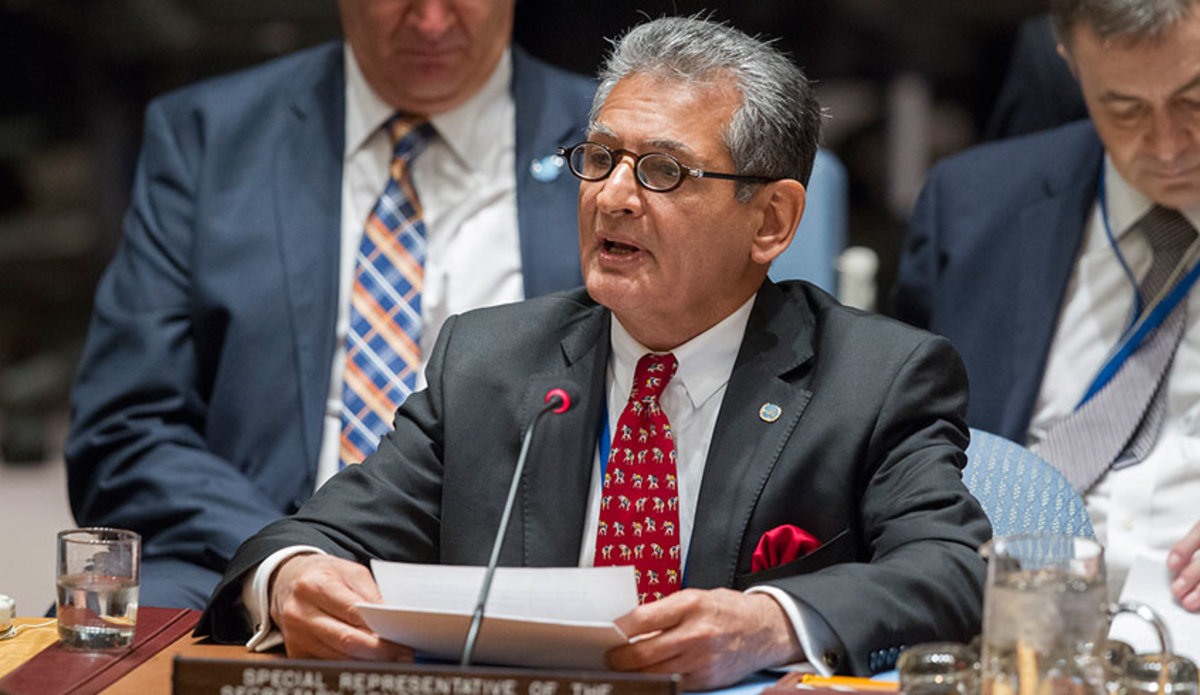In Security Council briefing, SRSG Farid Zarif says security transition is significant milestone
(Monrovia/New York) Briefing the United Nations Security Council today, the Special Representative of the Secretary-General (SRSG) and Coordinator of UN Operations in Liberia, Farid Zarif, said both the Government of Liberia and the United Nations Mission in Liberia (UNMIL) were confident that the priority targets in the country’s security transition plan will be met by 30 June, the deadline for the country to take full responsibility for its own security.
The SRSG said meeting the deadline set by the Security Council requires sustained political commitment. “More concerted efforts by the Executive and Legislature are required to ensure the urgent enactment and implementation of critical legislation relating to the security sector,” he said, citing the draft Firearms and Ammunition Control Act, the Police Act and the Immigration Service Act.
“UNMIL has continued to hand over security responsibilities to national security agencies,” Zarif said. Since the previous Security Council session on Liberia in September, Liberian authorities have taken over security responsibilities for the two national prisons and are making steady progress on the four remaining tasks – security for VIPs, registration and inspection of Government-owned weapons, maritime patrolling and explosive ordnance disposal.
“The Mission remains engaged with the Liberian security agencies to advance the development of institutional structures and legal frameworks for the justice and security sectors, as well as the establishment of accountability mechanisms,” Zarif said. This includes the training and mentoring of their senior management and supporting further decentralization of security services at the regional and county levels, and the establishment of county and district security councils.
Closely linked to the security transition is the UNMIL drawdown, which will reduce the number of UNMIL uniformed personnel to 1,240 military and 606 police by 1 July. UNMIL has also continued to consolidate its civilian deployments and activities in line with the tasks mandated in resolution 2239 of September 2015. “By 30 June, UNMIL will have consolidated its county field offices into five regional offices,” he said, adding that the Mission has proposed a 30 per cent reduction in UNMIL’s civilian staffing for the 2016-2017 fiscal year beginning on 1 July.
“The closure of the field offices has been accompanied by a proactive public information campaign, including the holding of ‘town hall’ meetings between senior Government officials and local communities,” Zarif said. “I have personally attended most of these meetings to explain the objectives of the security transition, to emphasize the importance of the Liberian security actors exercising full responsibility, to remind the communities of their role in maintaining peace and security, and to assure them of the UN’s continued support,” he said.
The SRSG noted the request of the Presidents of Liberia and Côte d’Ivoire for UNMIL to remain in Liberia until after the 2017 elections, as well as a petition to the Security Council from three opposition political parties and several civil society organizations calling for the postponement of UNMIL’s departure.
“The expected completion of the security transition on 30 June will be one of the most significant milestones for Liberia and the international community since the end of the country’s civil war and the signing of the peace agreement in 2003. It will also mark the beginning of a new phase in the UN’s engagement in Liberia,” he said, adding that Liberia and its partners must remain focused on sustainable peace, which will require longer term engagement and support by the international community.
The Security Council previously set 15 December as the deadline for it to decide on UNMIL’s future.
 UN
UN United Nations Peacekeeping
United Nations Peacekeeping





